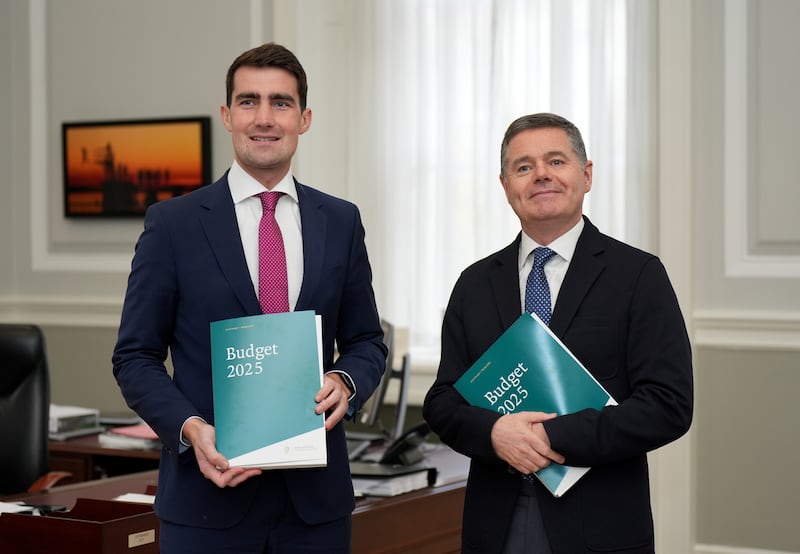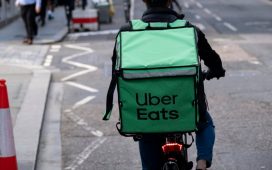Key Reads
Many families will gain thousands of euros over the next 12 months, as the Government seeks an electoral launch pad from today’s budget.
Tax changes are expected to increase average wages by about €1,000 and a series of one-off payments in the coming months, including €250 in energy credits and two double payments of child benefit, will be among the measures announced in Budget 2025. The budget will be unveiled in the Dáil at 1pm. The Green Party was happy last night to secure a triple payment of child benefit as a “baby boost”.
A range of other spending commitments will amount to the biggest budget giveaway to households, with an election due by March of next year and expected by many to take place in November.
The Government will project a large surplus, again driven by bumper corporation tax receipts, while also setting money aside into its savings funds. The Government is also expected to announce that some of the proceeds of the Apple tax case will be committed to investment in four areas – water, electricity, transport and housing.
The Irish Times understands that welfare increases will include a €15 increase for maternity and paternity payments; a package for carers will include an increase in the Carer’s Allowance means-test limits to €625 per week for a single person and €1,250 per week for a couple; an increase in the Carer’s Support Grant to €2,000 from €1,850; and the Carer’s Benefit will be extended to self-employed workers.
Overall there will be a €12 increase to weekly welfare payments, and a €20 increase in the Domiciliary Care Allowance. Student grants will also increase by 15 per cent. The Qualified Child Payment will be renamed as the Child Support Payment – and weekly payments for under-12s will be increased by €4 to €50 and for over-12s increased by €8 to €62.
Read our budget Main Points here.
There is expected to be a support fund for regional airports as part of efforts to support balanced growth and relieve pressure on Dublin Airport due to the passenger cap there, reports Cormac McQuinn.
The 32 million annual passenger cap was a condition of planning permission for the second terminal in 2007.
Airport operator DAA has warned it is likely to breach that cap by at least a million passengers this year. It is looking to extend the limit to 40 million.
Minister of State James Lawless – whose remit covers international transport – has previously spoken of the need for airlines need to move away from their dependency on Dublin Airport.
It is understood he sought the support fund in the Budget for Shannon and Cork with other smaller regional airports which is aimed at encouraging balanced growth.
There is also to be investment in ports to help them prepare for the development of the offshore renewable energy industry and increase shipping capacity.
The final cost of living package will now come in at just shy of €2bn, well in excess of the €1.5bn that had been expected, writes Jennifer Bray.
Most of this will be made up of lump sum payments to be given out over the autumn and winter. There are ten lump sum payments due to be announced and they are:
An October bonus double payment for welfare recipients, another welfare Christmas bonus payment, a €400 disability support grant, €400 carers support grant, €300 fuel allowance payment, a November double child benefit payment, a December double child benefit, a €200 living alone allowance, a €400 working family payment, a €100 child support grant for those in receipt of the qualified child increase payment.”
We have more from the Taoiseach Simon Harris explaining why this is not the biggest giveaway budget in the history of the State.
He said the Government has taken a “sensible approach” to Budget 2025 which includes a cost of living package that will “help people in the here and now,” reports Sarah Burns.
Mr Harris has also denied that it looks like a “if you have it, spend it” Budget with “billions and billions of a surplus” set aside for the future.
Speaking on his way into Cabinet this morning, the Fine Gael leader said there were three elements to Budget 2025 – a cost of living package between now and Christmas, a spending package for next year as well as a package to “substantially increase” the scale of investment in infrastructure. He said the Government had taken a “balanced approach” and insisted they had listened to the public.
The Taoiseach said while the country was at full employment and inflation was falling, cost of living challenges were still “real” for people across the country.
“People in this country are saying ‘yes Simon, the economy is going well but I’m still worried about the electricity bill, I’m still worried about the energy bill’,” he told reporters.
Mr Harris also said it was “completely untrue” suggestions there was “nothing” in the Budget for the hospitality sector, adding there would be “an exciting package of support” for businesses.
However, he said there did need to be “an honest conversation” about the cost base being faced by smaller businesses in particular.
The Taoiseach also acknowledged there would be an election in “due course” and the latest Budget was to show people the Government was “listening”.
“I’m a bit old fashioned for a young politician,” he said. “I think that if you come to work and do a good job people might actually vote for you and therefore I think it’s fair to say that the focus of all three parties in Government on this budget has been to deliver a good budget to show people that we get it, that we’re listening.”
Mr Harris added that it would have been “absolutely galling” for the Government to stand up in the Dáil later today and say “the economy is going well but there is nothing we can do to help you until January despite having a large surplus this year”.
“It wouldn’t have been acceptable to the people of Ireland and Government.”
He said while the details of the Budget would be debated, he believed that many families, older people, carers and people with a disability would by the end of today “feel seen by this Government and I think that’s important in politics”.
When is a giveaway not a giveaway?
Today’s budget will not be a giveaway one, according to the Taoiseach, Simon Harris. He said this morning the Government had taken a balanced approach, “a sensible approach … it’s about giving people a little bit of their own money back”.
“I make no apology for giving people a little bit of their own money back between now and Christmas, because that’s the buffer we need to provide people with, to allow the timeline between inflation falling and bills falling.”
‘’We’ve chosen to not spend billions of euro that we have to protect our future. We’ve chosen to put that into a fund for climate emergency,” Mr Harris said.
“We’ve also got to listen to people and if there is anyone in Ireland or in Dáil Éireann who thinks that the cost-of-living crisis isn’t real, who thinks that people don’t need a bit more support in raising their kids in terms of financial assistance, I’d like to meet those people, because it’s not where people in this country are at.”
The budget will be an ecumenical matter
What will the “size” of the budget be? Normally there is a headline figure but calculating what it is this year is something of an “ecumenical matter”, according to Cliff Taylor
First up is the package of once-off payments going to households, likely to total close to €2 billion. The signs are that the vast bulk or perhaps all of these will be paid this year. Nerds like myself would point out that technically these are adjustments to Budget 2024 rather than matters for Budget 2025. But this small matter is unlikely to worry the politicians or headline-writers.
Second are the tax and spending measures that are the normal fare of budget day. These have long been signalled at around €8.3 billion. Add this to the €2 billion in once-offs and you go over €10 billion.
This is probably the fairest estimate of the size of the package. But the Government will also allocate another €3 billion from the sale of its shares in AIB to investment projects over the next few years. If you want to add that in you get over €13 billion. And then there is the €14.1 billion coming from Apple.
Here the Government is going to give indications of where the money might be spent, but not allocate it in detail. And so we head over €27 billion.
You can choose your own preference – I will stick to €10.3 billion for now and see what exactly happens today.
Tired eyes and tensions as budget day dawns
Bleary eyed officials are making their way back into the Department of Finance and the Department of Public Expenditure after a late night. One sleepy mandarin says printing of the documents didn’t get under way until about 4.30am, after being checked and rechecked.
Political meetings ended after midnight, but officials then had to make sure that the sums added up and the figures were correct.
Political tensions were greater than previously in the final days – a function both of the proximity of a general election when Fianna Fáil and Fine Gael will compete for votes, but also of the fact that Fianna Fáil basically thinks Simon Harris is trying to hog the credit for everything. The lads would never do anything like that, of course.
That comes from Political Editor Pat Leahy. It should be pointed out that The Irish Times political team are pretty bleary eyed themselves after what must seem like an endless sequence of late nights and leaks. They’re not done yet and have a fair few miles to go before they sleep.
The Government will approve a once-off €1,000 reduction in student fees – less than the €1,500 sought by Minister for Higher Education Patrick O’Donovan – and it will not be permanent as had been sought, writes Jack Horgan-Jones. The move will bring the cost down to €2,000
There will be a once-off reduction of apprentice contribution of €1,000 (a third). For Post Grad Supports the fee contribution will increase from €4,000 to €5,000. The total once-off package will amount to €100m in supports for third -evel students.
A winners-only budget?
The traditional winners-and-losers narrative is out the window with giveaways across the board, reports Eoin Burke-Kennedy. Opposition parties will struggle to land a blow and perhaps, on the eve of an election, that’s the point.
Economists will, however, criticise the size of the package (it’s almost the same size as last year’s) when inflation has subsided but most of all they will criticise the untargeted nature of many of the one-off payments.
Many of them, including the double child benefit, will go to families who don’t need them or to households who are no longer in the grip of a cost-of-living crisis with real wages rising again. The same goes for the €250 energy credit. Last year an estimated €100 million of these energy credits went to families who own more than one home.
Far be it from us to put words in Paschal Donohoe’s mouth but it appears that when saying “you can’t deliver everything that is expected” he was ruling out any reduction of the VAT rate for the hospitality sector – or even part of it.
Minister for Public Expenditure Paschal Donohoe has been speaking on his way into Leinster House. “You can’t deliver everything that is expected of us. But there are many other measures contained within the budget that I believe can make a very positive difference to small businesses across the country.
“Measures from a spending point of view will be outlined today to help businesses at a particularly costly time and changes will be made that will be important for small businesses. From the point of view of the taxes they pay, so many other changes are happening.
“The most important thing, of course, we can do to support small businesses and indeed employers of all sizes within our country is have a healthy economy that is capable of continuing to grow in the future. And this budget will deliver that.”
Minister for Health Stephen Donnelly will announce an expansion of the publicly funded IVF scheme as part of Budget 2025, reports Jack Horgan-Jones.
Introduced just a year ago, more than 1,200 couples have availed of it so far and the first babies have been born.
Donnelly plans to expand the scheme in two areas during 2025.
First, to include donor assisted IVF. Currently couples who require a donor egg/sperm are unable to access publicly funded IVF because donor materials are not regulated.
However, with the passing of the Assisted Human Reproduction Act this year and work on the establishment of the Assisted Human Reproduction Regulatory Authority under way, it will be possible for couples requiring donor assistance to access the scheme during 2025.
Donnelly is also planning to amend the access criteria to include couples experiencing what is known as ‘secondary infertility’ – these are couples who have an existing child but then have fertility issues. One element of the current criteria sets out that a couple accessing publicly funded IVF must have no living children together.
Why is it called a budget anyway? We are very glad you asked.
The word budget as we use it today was most likely coined in a satirical cartoon of the-then British prime minister and chancellor of the exchequer Robert Walpole in 1733. After he published details of Britain’s finances, a cartoon in a satirical magazine featured him opening a bag of snake oils under the not entirely hilarious caption: “The Budget Opened”.
And what was a budget? Well, in middle English and old French a budge was a small suitcase – it is part of the reason ministers still carry a briefcase into the Dáil on budget day.
And now you know.
A late night for one Minister and an early start for another
The budget is all done … night now.
A new universal companion pass for people aged over 70 will also be introduced with everyone over that age allowed to bring family member or friend on public transport free of charge, reports Political Correspondent Jennifer Bray.
As it stands people over 70 can apply for a companion pass provided they satisfy a medical assessment but as part of Budget 2025, Minister for Social Protection Heather Humphreys has secured agreement to make the pass universal for all over-70s in a move designed to tackle issues such as isolation and loneliness.
The start dates for two significant social welfare reforms will also be announced as part of Budget 2025.
Pay Related Benefit, which ensures those with stronger working histories receive higher welfare payments if they lose their jobs, will start on March 31st, 2025, while the long-promised pension enrolment scheme will start on September 30th, 2025.
By way of a public service announcement, if you are planning to be in Dublin city centre today you can expect significant traffic restrictions around Leinster House with a significant Garda presence and barriers installed on all the approach roads to the Dáil.
The following locations are impacted
• Across Molesworth Street
• Across School House Lane
• Across Kildare Street in the vicinity of Setanta Place
• Across Kildare Street in the vicinity of the Shelbourne Hotel
• Across Merrion Square West in the vicinity of Clare Street
• Across Merrion Square South opposite Leinster Lawn
• Across Merrion Street Upper in the vicinity of Reilly’ Bar
• Across Merrion Street Upper opposite Government Buildings (Fitzwilliam Lane) beside Merrion Hotel.
So, how do we know so much about what is going to be in the budget this year?
And was it always like this? The answer to the second part of your question – actually, it’s not your question, it’s our question but anyways – is a resolute no.
The annual budget used to be one of the most closely guarded secrets in Irish – and indeed in world – politics.
Going all the way back to the late 1940s, the then British chancellor of the exchequer Hugh Dalton was forced to resign after making a casual remark about his budget plans to a journalist that then found its way into the evening papers minutes before he delivered his speech to the House of Commons.
Can you imagine if the same rules applied today? There’d not be a Minister left in Dáil Éireann today.
In an Irish context, for donkey’s years, the budget plans of the minister for finance was as tightly guarded a secret as the Third Secret of Fatima.
Leaks were a sackable offence. Then Fianna Fáil started releasing – slightly secretly – the top lines of the budget to the evening newspapers on the day of publication. It slowly became a free-for-all and these days almost every line in the budget is flagged well in advance.

So, what do we know now? Thanks to our hard-working political reporters who’ve been assiduously mining various sources for weeks and a fairly newly found propensity amongst politicians to give all their secrets away early in the day we know almost everything.
Here are just some of the things you can expect to be announced later today.
- There will be two double child benefit payments before Christmas worth €280 per child
- The Universal Social Charge will be cut while the higher income tax threshold will rise by €2,000 with tax credits set to increase
- All welfare payments, including pensions, to increase by €12 per week
- A universal electricity credit will amount to €250 in two slices.
- The tax credits for renters will climb by €250
- Student fees to be reduced by up to €1,500 in this academic year
- There will be an extra living-alone allowance and lump sums for people with long-term disabilities.
- Children under nine will travel free on public transport from next summer.
- Parents of newborns will receive a once-off, triple child benefit payment
- Mortgage interest relief is to be extended
- There will be free schoolbooks up to Leaving Cert level.
- 1,500 additional special needs assistants
- 350 more special classes
- Junior Cert and Leaving Cert fees waived












